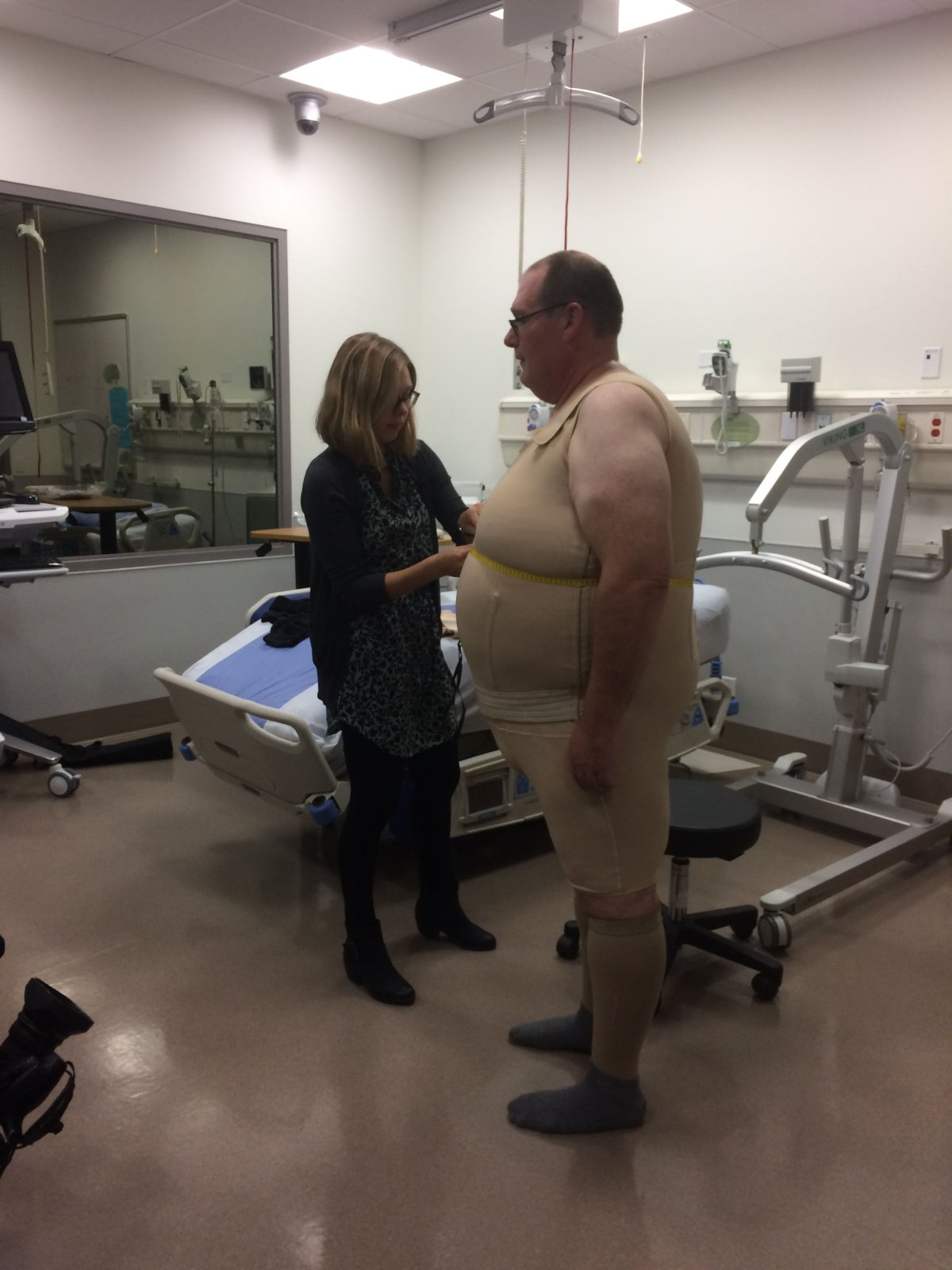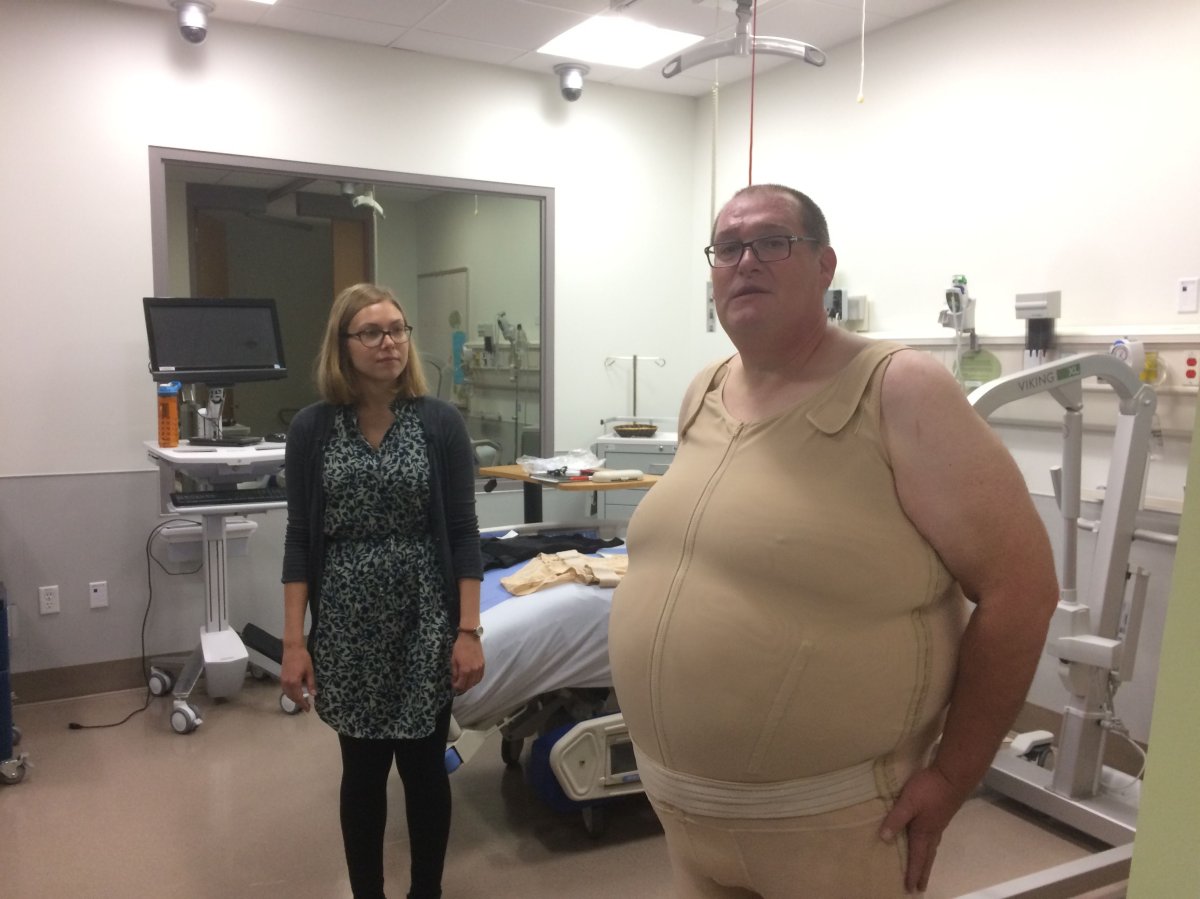A researcher at the University of Alberta is testing custom underwear – bariatric support garments – for patients in treatment for obesity.

“Spanx for larger people,” as Marty Enokson calls them, are now available at clinics across the province as part of a one-year pilot project.
“After I lost weight, I felt like a flying squirrel because there’s so much loose skin flying about,” Enokson said.
The 49-year-old paralegal had bariatric surgery eight years ago.
“The garments are like custom undies,” he explained. “They control the loose skin and keep things in place. You are flatter in the stomach and whole body.”
READ MORE: Ontario woman drops over 200 lbs. following gastric bypass surgery
While losing weight is an incredible accomplishment, medical staff stress bariatric surgery isn’t the end of the weight-loss journey. Most patients are left with loose skin, which can cause chafing, infections and back problems, not to mention wreak havoc on a patient’s confidence as they try to remain active.
“We were hearing from patients: ‘Is there anything on the market or could you make anything that would help provide me with the support that I need?’ We couldn’t find anything,” Mary Forhan, professor of occupational therapy in the U of A Faculty of Rehabilitation Medicine, said. “We discovered this product. It comes from France and we developed a partnership with this company to bring it into Alberta as a test market for Canada.”
Katelyn Teske, a clinical bariatric consultant and occupational therapist in the Faculty of Rehabilitation Medicine, went to France to learn how to do specialized fittings.
“It’s very precise,” Teske said. “Very tricky.”
READ MORE: ‘You just have to start’: Edmonton woman shares her 147-pound weight-loss journey
After four weeks of lessons, she is the only person in Canada trained to fit these types of garments.
“It’s been awesome. We have a Facebook page – the Bariatric Support Garment Clinics – and the response has really been quite overwhelming,” Teske said. “Last week our phone was ringing off the hook. Very exciting. We’re booked two weeks solid.”
She said there are about 30 different designs to choose from and customize, including options with legs and sleeves. The garments – which are not covered by Alberta healthcare – range in price from $400 to $900.
“There’s a nice variety for people, between daily wear, sports and even swimsuits.”
Forhan and her team wanted to open clinics so that anyone living with excess skin due to weight loss could have access to this supportive underwear.
READ MORE: Weight-loss tourism costing Alberta taxpayers thousands to fix medical mistakes
The six bariatric support garment clinics are in Edmonton, Calgary, Red Deer, Grande Prairie and Medicine Hat. The team hopes other provinces will consider making the garments available as well.
“Patients were describing the confidence they felt while moving around at the gym or in public or at work,” Forhan said. “They felt more assured and safe … and they felt that they looked better.
“Some patients were describing feeling more confident in their ability to do things.”
A preliminary study last year showed 93 per cent of patients found that wearing the garment increased their confidence and comfort to participate in everyday activities including exercise.
“I’m very comfortable wearing this garment and I think any obese patient would be,” Enokson said.
“It is comfortable, it breathes and it allows you, as an obese patient, to have confidence. It allows me to have confidence in myself.”
Currently, Alberta doesn’t cover skin removal and/or reconstruction, except for one part of the body near the abdomen, a surgery that patients say has a wait list between two and five years. Those seeking full body contouring surgery have been quoted between $20,000 and $30,000, Forhan said.
For many patients, she says, a support garment is their only option.
“Results of the one-year pilot program will be presented to the Alberta government for consideration for inclusion of the garment in the provincial aids for daily living program,” Forham said.
READ MORE: How Canadian mom Jennifer Petrucci lost 129 pounds and 10 dress sizes
Enokson wears a garment every day: one for work and one for working out. He used to be laughed at while at the gym.
“Sitting on a bike or running on a treadmill, I’m tired of being that spectacle because of all the loose skin,” he said.
“I didn’t want to be that spectacle anymore but I didn’t want it to defeat me. I wanted to continue to work out in the gym and continue to go on my journey that my biariatric surgery had allowed me to have,” Enokson explained.
“I wear the garments and I feel like I’m treated like everyone else. It brings you confidence while you’re doing great things to make yourself live healthier.”












Comments